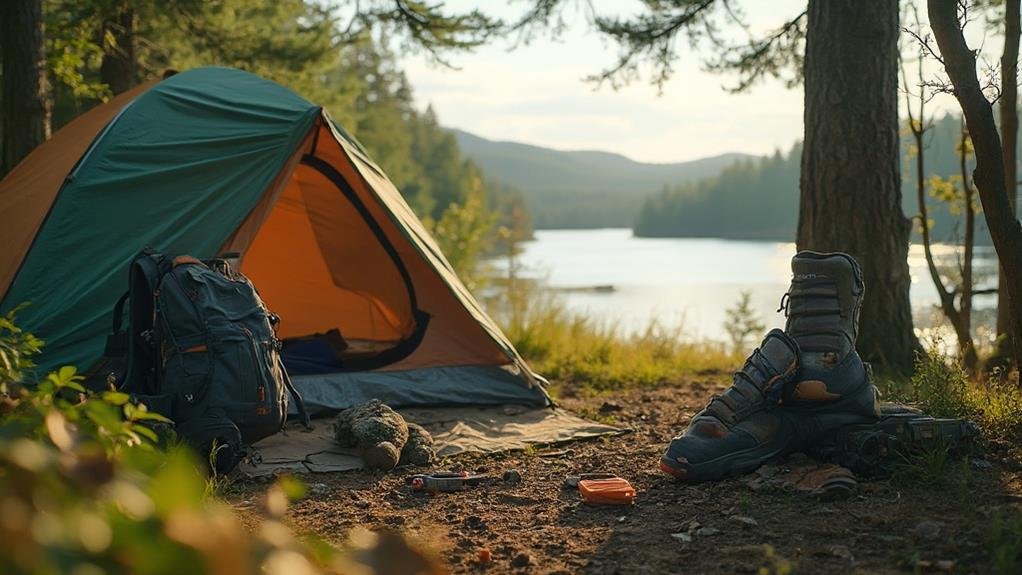
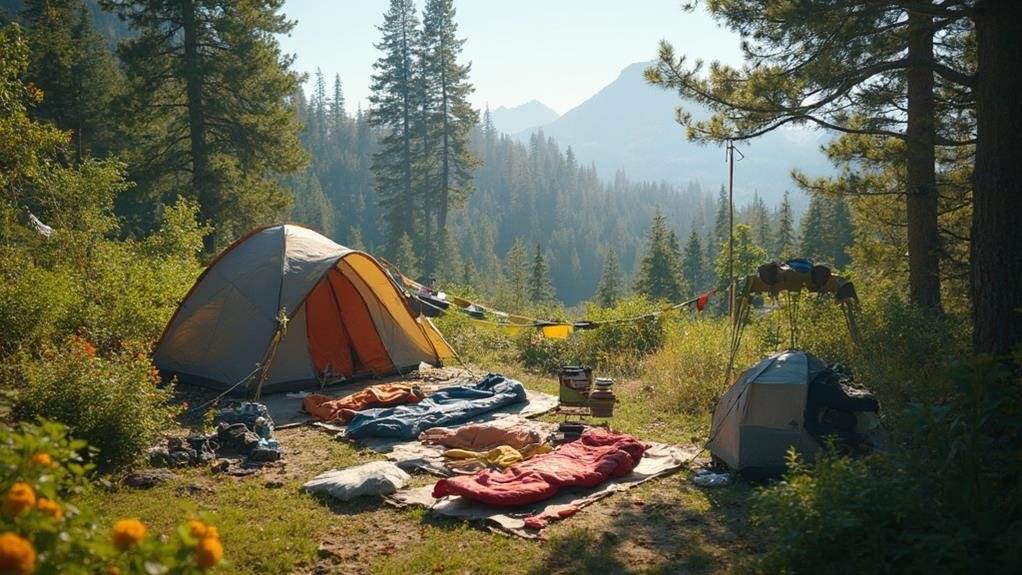
After a thrilling adventure in the great outdoors, the thought of cleaning your camping gear might seem less exciting, yet it's essential for the longevity of your equipment. You can't simply toss everything into a storage bin and forget about it. Instead, you should carefully clean and inspect each item, from your tent and sleeping bags to your cooking tools and hiking boots. How do you guarantee that mold doesn't become an unwelcome guest in your gear collection, and what steps should you take to prepare electronics for storage? Let's explore the best practices for keeping your gear in top shape.
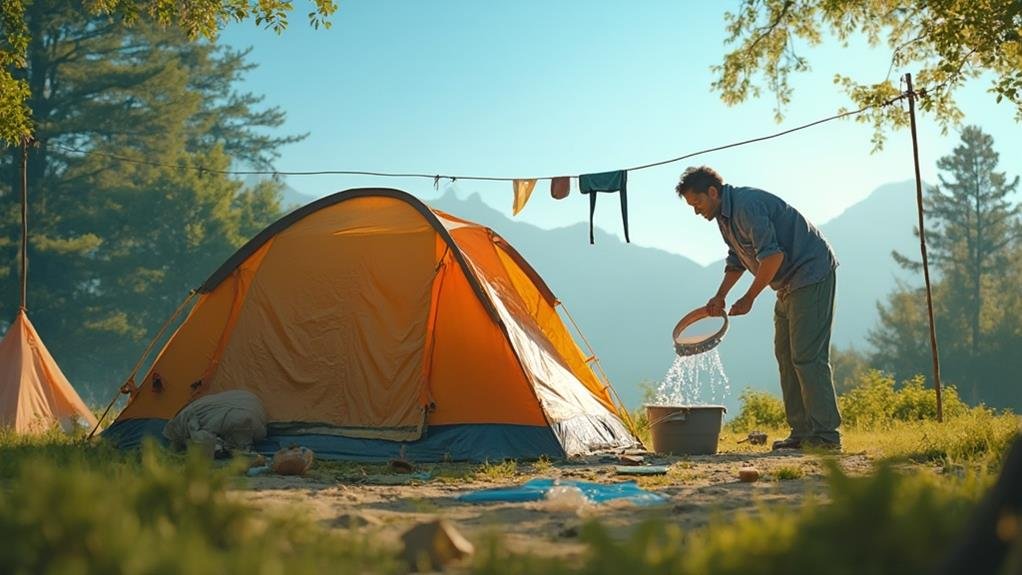
Keeping your tent clean is essential for its longevity and performance, so it's important to regularly remove dirt and debris. Start by shaking out loose dirt and leaves from the inside and outside. Use a soft brush to gently scrub away any mud or stubborn dirt, being careful not to damage the tent materials.
It's a good idea to check for any small tears or holes while you're cleaning, as spotting these early can prevent bigger problems later. If you find any, consider patching them up with a tent repair kit to keep your tent in top shape.
When cleaning the tent, avoid harsh chemicals that might harm the fabric or waterproof coating. Instead, use mild soap and lukewarm water. Gently sponge down the tent, focusing on particularly dirty spots, then rinse thoroughly.
Confirm it's completely dry before storage to prevent mold and mildew. You might find it helpful to set it up in a shaded area for drying.
Regular maintenance and cleaning can extend your tent's life, saving you from frequent tent repairs. Remember, taking care of your tent not only preserves its function but also enhances your camping adventures.
After confirming your tent is clean and ready for storage, it's time to focus on your sleeping bag. Keeping it fresh and cozy for your next adventure is vital, so let's explore the washing process.
First, you'll want to check the care label on your sleeping bag for any specific instructions. Generally, follow these steps:
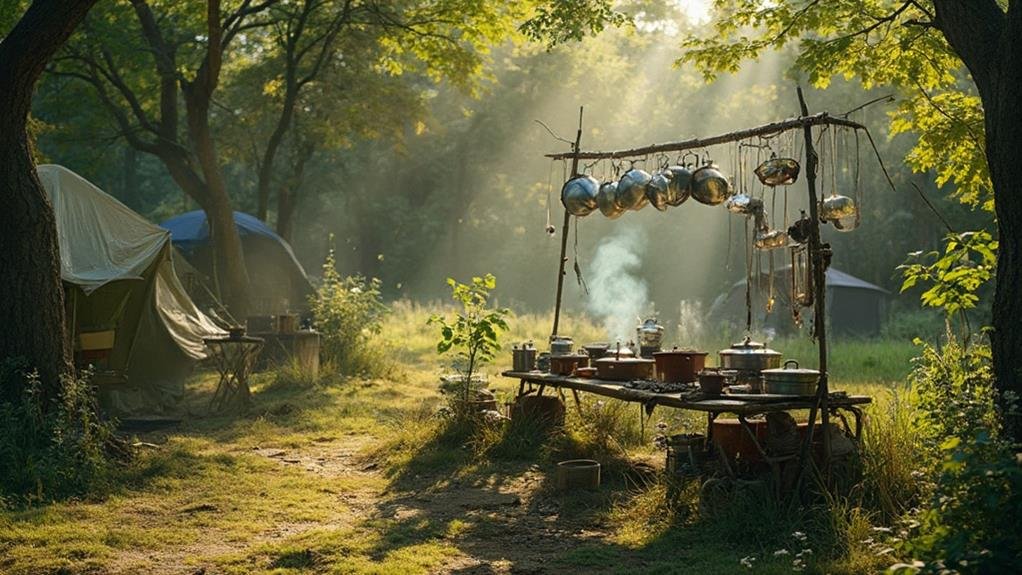
Your camping trip can only be as good as the meals you prepare, so maintaining your cooking equipment is essential.
First off, make sure to clean your cookware immediately after each use. This prevents food from sticking, making it easier to clean later. Use warm water and biodegradable soap, scrubbing with a sponge to remove any stubborn bits. Avoid using abrasive pads, as they can damage non-stick surfaces. Rinse thoroughly, ensuring no soap residue remains, which might affect your next meal's flavor.
After cleaning, focus on organizing utensils. Keep your spatulas, knives, and forks in a roll-up organizer or a small container to prevent losing them. This keeps everything in one place and saves time when you're cooking those campfire meals.
Dry your utensils completely before storing them to prevent rust, especially if you have metal tools.
Once everything's clean and dry, pack your cookware and utensils in a designated bag or box. This protects them from dirt and damage during transport. Store them in a cool, dry place until your next adventure, ensuring they're ready for quick retrieval.
With well-maintained gear, you'll always be prepared for a delicious outdoor feast.
Few things can ruin a hike faster than uncomfortable boots, so taking care of your hiking footwear is essential. Properly maintaining them guarantees they last longer and feel better on the trail.
Start by cleaning your boots after each adventure. Gently brush off dirt and mud, which can damage the material over time. When it comes to waterproofing, make certain to apply a suitable boot waterproofing treatment. This keeps your feet dry and comfortable, no matter the weather.
You should also pay attention to the insoles. Over time, they lose their cushioning, affecting your comfort. Consider an insoles replacement if you notice any discomfort or if they've seen better days.
Here are some steps to maintain your boots:
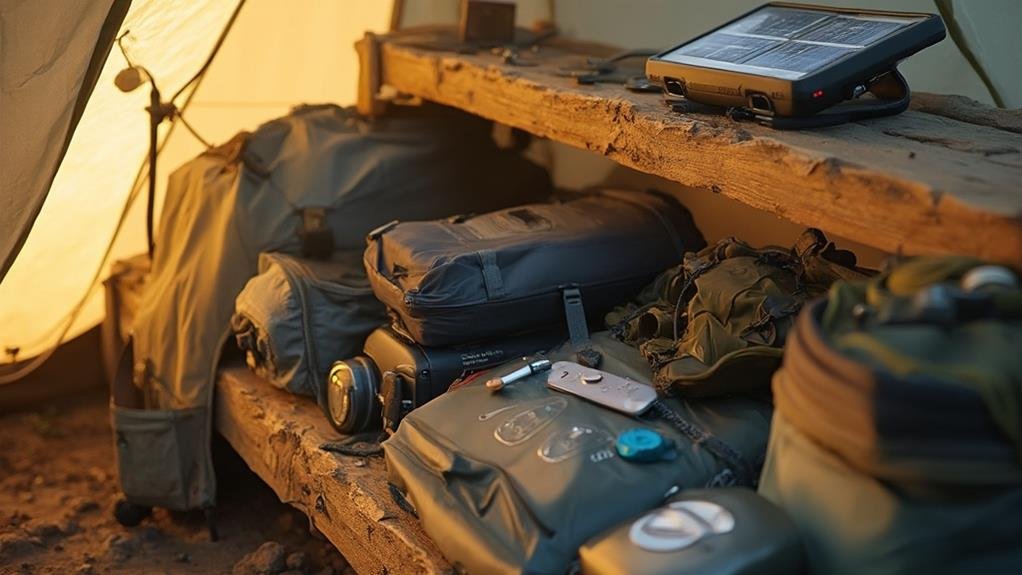
When you're packing up from a camping trip, don't forget to give your electronic devices the care they need for safe storage.
After enjoying nature, your gadgets might need some TLC. Start with battery care—remove the batteries from your devices to prevent any leaks or corrosion over time. It keeps your electronics in top shape, ready for the next adventure. If your device has a built-in battery, make sure it's charged to about 50% before storing, as this helps maintain battery health.
Next, focus on moisture protection. Even if the weather was perfect, camping gear can attract moisture. Use silica gel packs or a dry box to absorb any lingering dampness.
It's a simple step, but it can save your electronics from damage. Make sure to wipe down your devices with a soft, dry cloth to remove any dust or grime.
Sign up for our newsletter to receive the latest gear reviews, tips, and exclusive offers. Stay informed and inspired for your next outdoor adventure!